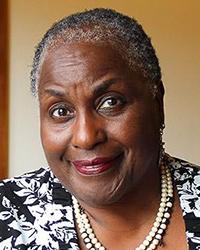Marva Lewis has done something very exciting. She recently co-developed a 4-module community stress relief curriculum called "The Ubuntu Program for Emotional Wellness" that uses resilience-building practices like collective storytelling in order to relieve some of the chronic stress in African American communities that is due to the legacies of the historical trauma of slavery. Read more.
The curriculum was just released this past June of 2017 and it uses an African American cultural practices-based approach, which includes resilience-building practices like collective storytelling in order to relieve some of the chronic stress in African American communities that is due to the legacies of the historical trauma of slavery. She finds this project particularly important because it is a free curriculum that gives people tools to talk about and heal from racism as well as the language and space to engage in conversations they may not otherwise have -- and it can be used by anyone with access to the internet.
Marva recognizes the ways in which chronic stress can deteriorate the health and wellbeing of individuals and communities as well as increase the risk of both experiencing and enacting violence and so she is very excited about this tool that not only combats stress but actually encourages personal and community flourishing. The curriculum promotes greater awareness and understanding of the forms of stress, violence and trauma that we experience in everyday life, like witnessing authority-based violence; recognition of the biological, psychological, and social impacts of these experiences; and strengthening of communities by amplifying individual and collective healing.
Marva’s involvement in developing this curriculum makes good sense given the extensive history of her research around responses to the legacies of the historical trauma of slavery in African American communities, including colorism, negative self-talk, unsafe hair practices, and the intergenerational transmission of violence. She was intentional in her framing of culture as both a source of healing and vulnerability throughout the curriculum.
Marva is passionate about uplifting and celebrating the power of the culture of enslaved African Americans as a model of resilience and of healing, thriving and nurturing ourselves and others. She created this curriculum as a way to move forward from violent and traumatic experiences without passing on the same level of hurt that was received.
Access the free Ubuntu Emotional Wellness Curriculum here!
Please see these ancestral publications in the lineage of Marva’s work:
- Ashing, K. T., Lewis, M. L., & Walker, V. P. (2017). Thoughts and response to authority-perpetrated, discriminatory, and race-based violence. JAMA pediatrics, 171(6), 511-512.
- Harrington, J. L., Lewis, M. L., Brinthaupt, T. M., & Turnage, B. F. (2013). The Relationship between Race-Based Self-Talk among African-American Women and Poor Birth Outcomes. International Journal of Childbirth Education, 28(3).
- Lewis, M. L., Norona, C. R., McConnico, N., & Thomas, K. (2013). Colorism, a Legacy of Historical Trauma in Parent-Child Relationships: Clinical, Research, and Personal Perspectives. Zero to Three, 34(2), 11-23.
Keep an eye out for this upcoming paper Marva is co-authoring on the topic:
- Lewis, M. L., McConnico, N, & Anderson, R. E., (In process). Making Meaning from Trauma and Violence: The influence of culture and traditional beliefs and historical trauma. In, (Eds.) J. D. Osofsky & B. M. Groves, Violence and Trauma in the Lives of Children.
To view a foundational publication for Marva’s work, please see:
- Sotero, M. (2006). A conceptual model of historical trauma: Implications for public health practice and research. Journal of Health Disparities Research and Practice, 1, (1), 93-108
For other resources related to stress:
- Stress and Health Disparities Resources. American Psychological Association. Accessed July 18, 2017.

